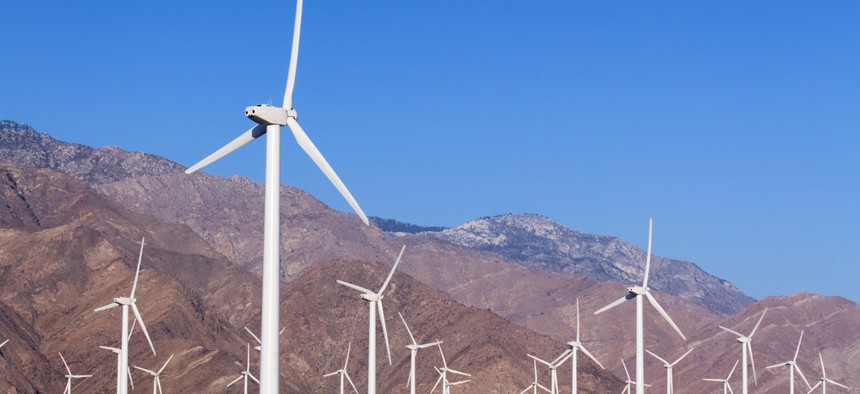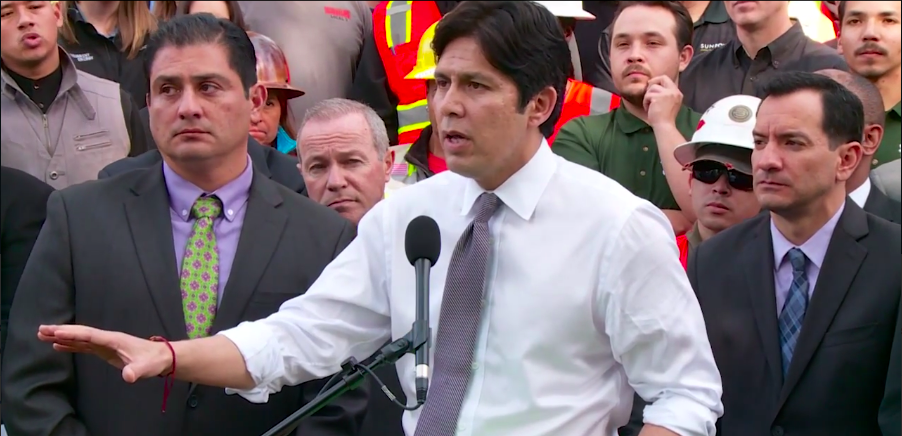California Leaders Unveil a Major New Climate Technology Initiative

A wind farm near Palm Springs, California Sumikophoto / Shutterstock.com
State legislators have set some ambitious energy usage reduction goals and want to create jobs at the same time.
LOS ANGELES — California state Democrats announced an ambitious set of newly proposed environmental standards on Tuesday aimed at creating sustainable economic growth through technological innovation.
“My colleagues and I have seen clean energy jobs growing across California and we want to make sure they reach all of California,” state Senate President Pro Tempore Kevin de León said during a press conference in Sacramento announcing the California Climate Leadership initiative.
De León was joined by approximately two dozen leaders from the private sector, organized labor and environmental organizations, including representatives from eBay, SunEdison, the Union of Concerned Scientists, the Sierra Club and the American Lung Association. He was also joined by a number of fellow state lawmakers.
The proposed legislation calls for Californians to consume 50 percent less petroleum, derive at least 50 percent of energy from renewable resources and to increase energy efficiency by 50 percent, all by 2030. A second bill sets an overall climate pollution target for 2050.

De León, pictured here, said the coalition hoped that the legislation would receive bipartisan support at the State Capitol, pointing to a number of local success stories where technological innovation has been used to create well-paying, sustainable jobs, particularly in areas hit by changing economic conditions.
Specifically, he pointed toward Kern County, which is home to around 850,000 residents includes areas such as Bakersfield. The county is heavily dependent on its petroleum production and recent drops in oil prices have had a significant impact on local residents.
“When gas prices fall, residents in Kern [County] are laid off,” de León said. But he also pointed out that the county is home to the Alta Wind Energy Center, the world’s largest wind farm. A recent construction project at the site begun in 2010 has brought an estimated $1.2 billion into the county and created more than 3,000 jobs.
“We just passed Brazil to become the seventh largest economy in the world,” he said. “Clean tech companies in California are creating more jobs and investing more money in competitors than in any other state.”
State Sen. Ben Hueso said the climate proposals also seek to create what he called a “state sanctioned think tank” that “will ensure that job creation is at the forefront of every discussion” on climate and technology.
Speaking for the private sector, KB Homes’ Craig LeMessurier said his company had built close to 4,000 homes in Southern California in recent years that generate their electricity through solar power. “It’s not only created jobs but saved homeowners thousands of dollars in utility bills.”
However, de León said a priority for state lawmakers and Gov. Jerry Brown is ensuring that the proposed regulations are targeted to create economic growth in some of California’s more economically challenged areas, noting that the proposal would create jobs across the board, even for common labor tasks such as the planting of trees.
“We are going to invest $235 million in the most impacted communities in California,” he said. “We’re talking about the men and women who look like California and putting them back to work with real, tangible investments in the hardest hit communities. It’s not just for certain ZIP codes.”
Eric Pfeiffer contributes regularly to GovExec State & Local and is based in Los Angeles.
(Top image by Sumikophoto / Shutterstock.com; second image via a California Senate Democrats livestream.)





